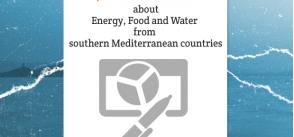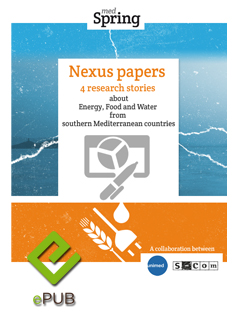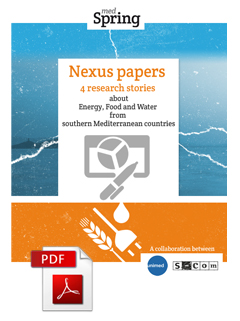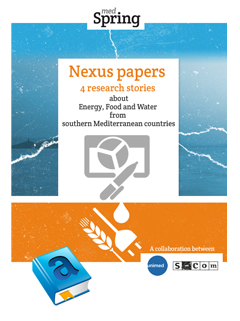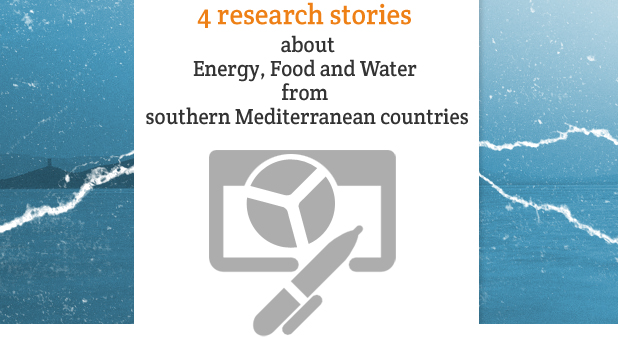
Nexus papers | ebook
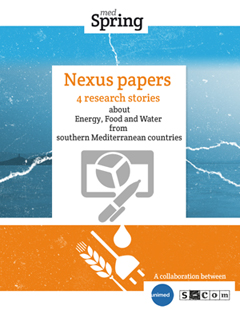 At least from the last decade water scarcity, food insecurity and dependence on traditional forms of energy have been widely recognised as the challenges for the new century. Until recently, however, the research and policy communities have addressed these challenges in isolation, without considering their interlinkages.
At least from the last decade water scarcity, food insecurity and dependence on traditional forms of energy have been widely recognised as the challenges for the new century. Until recently, however, the research and policy communities have addressed these challenges in isolation, without considering their interlinkages.
The water, food, and energy nexus has emerged as a comprehensive approach to target the synergies and trade-off existing between water usage, energy, and food production opening the way to cutting-edge and innovative analyses and solutions. The nexus approach benefits also from the inclusion of various constituencies in the debate on how to guarantee a sustainable development based on a responsible and equitable exploitation of natural resources.
MedSpring is actively involved in further advancing the debate on the water-food-energy nexus by also integrating it in a regional perspective: the Mediterranean.
Among its activities, MedSpring's think tank, the EMEG (Euro-Mediterranean Expert Group) will meet in a three-days discussion to develop "a frame for a comprehensive understanding of water-food-energy nexus" (Malta, 30th September-2nd October).
In addition and thanks to the collaboration of Unimed, MedSpring has launched a call for contributions addressed to young researcher from southern Mediterranean countries to promote innovative research on the Nexus among Energy; High Quality Affordable Food and Scarcity of resources (mainly water) and how it satisfies the sustainability dimensions (economic, environmental, social and considering the institutional/governance dimension as cross-cutting).
MedSpring is honoured to present the selected authors and papers, whose contributions have been collected in a open-access e-book (available for download in .epub, .pdf and .mobi format).
Hanee M. Al- Dmoor
(Scientific Food Center, Jordan)
Building up new knowledge on food frauds to develop food strategies for defense plans.
Food fraud is now a global problem, the number and characteristics of food fraud has increased and sophisticated fraud, moreover quantifying the economic or public health impact of food fraud remains difficult. We are building up new knowledge on food frauds to develop food strategies for defense plans.
Oula Amrouni
(National Institute of Marine Sciences and Technologies, Tunisia)
Coastal evolution of sandy coasts in Tunisia in the context of Climate Change, and adaptation strategy
On current pressure of climatic changes, provides information on present sedimentary structures, processes and relationships of the marine environment around coastlines worldwide helps to understand how this system operate. The coast of Tunisia has been the subject of considerable interest since as early as the mid-19th century focusing on sedimentary processes on the littoral zone. Clearly, it would be very interesting to deduce a textural parameter which is characteristic for the profile under steady hydrodynamic conditions and independent of the changes in grain size of the sediment supplied. The distribution of such a parameter could be used in the prediction of the sediment behaviour and dispersion over the coastal profile in response to new inputs of sediment from natural or man-induced processes.
Ridha Elleuch
(University of Sfax, Tunisia)
Enhancement of c-Si solar cells efficiency by coupled plasmonic effects and combined light trapping/photon management by Ag/graphene/ZnO:RE layers
To our best of knowledge, combined plasmonic effects and light trapping/photon management of the incident sun rays is an original and very promising approach to enhance crystalline silicon (Si) solar cells. A new large surface Ag/graphene/ZnO:RE/Si solar cell architecture will be investigated to reach an efficiency up to more than 40%.
Taqiy Eddine Boukelia
(University of Constantine 1, Algeria)
Feasibility study of solar parabolic trough power plants for Algerian conditions.
In this study, investigation using 4E (energy-exergy-environment-economic) approach, selection of the best configurations, prediction and optimization using an Artificial Neural Network model in addition to the feasibility study of parabolic trough solar thermal power plant with large scale for power generation for Algerian climatic conditions have been performed.
Download the e-book "Nexus papers | 4 research stories about Energy, Food and Water from southern Mediterranean countries".
Scroll down and choose your format.
Ebook - .epub format [762 KB]
Ebook - .pdf format [1,2 MB]
Ebook - .mobi format [827 KB]
